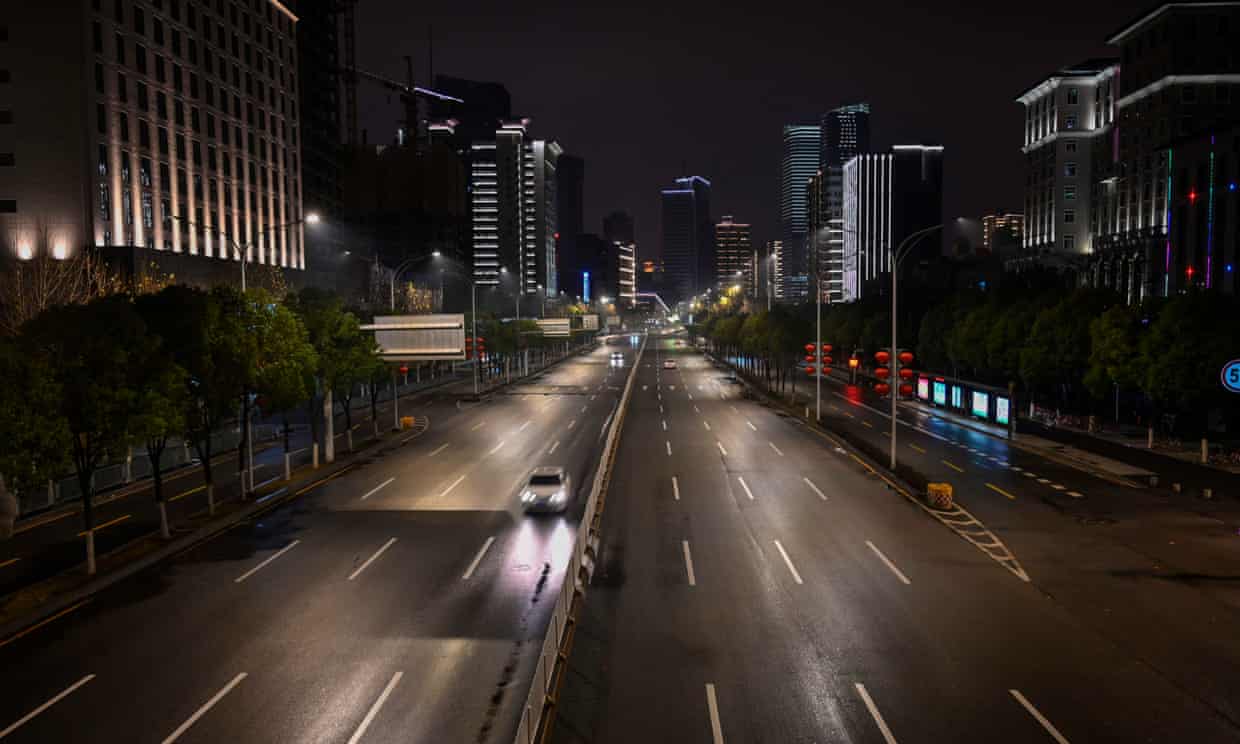
Coronavirus outbreak
'The city is suffocating': diary of the Wuhan coronavirus lockdown
A resident describes life in the city at the centre of the coronavirus outbreak
by Anonymous, as told to Wu Pei LinThursday 23 January (first day of lockdown) At 2am the government says my home town, Wuhan, is soon to be placed under lockdown. All the trains, flights and public transport will be cancelled. People have talked about the virus for a while. The spread of the outbreak is getting worse. I suppose it is the right decision.
When I go outdoors I am cautious and mostly stay in the car. There are 11 million people in my city but the streets are empty. We have never seen it like this before. It’s normal for a lot of the stores to be shut during Chinese new year but this is different. I’m lucky to find masks on my second run to a pharmacy. I go to the supermarket but vegetables are sold out.
Friday 24 January Today is Chinese new year’s eve. I wake up and a doctor friend tells me that because public transport has been suspended, health workers can’t get to work. Volunteers have begun driving them, and I decide to help.
I’m not afraid of being infected: the health workers are professionals and we do not have direct face-to-face contact during the ride. They sit in the back seat. I pick up my first health worker and he tells me he will be very busy with work that evening. He has only brought one pack of instant noodles with him: that is his New Year’s Eve dinner.
Afterwards, I go to a friend’s house. He is alone too because the lockdown prevented his family from visiting. We have a simple but nice meal. It is very different from past celebrations. Normally, I go travelling or spend time with my mother. Although there are only two of us, she always prepares a lavish meal for a proper celebration, with fried lotus root, Chinese kale and fish meatballs (we call these yuanzi in Chinese, yuan meaning “round” and symbolising reunion).
We don’t talk about the outbreak at the dinner table. It’s New Year’s Eve, after all. We should at least cheer up for tonight.
Saturday 25 January I wake up early and drive health workers to their shift. Because of the outbreak and lockdown, I have barely slept. The health worker tells me they do not know how long the city will be closed, and the situation is still worsening. The number of deaths and cases is increasing every day. I’m given a special mask for protection.
The health workers can’t share much information because what they say is easily misunderstood and spread and there may be repercussions for them. The health workers I help transport seem calm. I suppose the online videos [showing hospital staff breaking down] are the extreme. I try to focus on volunteering rather than being affected by everything I read online. Later, I hear that another volunteer has been infected.
The biggest problem with this outbreak is that information was not shared with the public quickly enough. This is a failing that cannot be undone. If the news was released earlier, the outbreak would not be as serious now. I don’t know enough about the situation with medical supplies, but I hope the government can mobilise to ensure hospitals are well stocked. I feel ordinary people like us are the main force protecting Wuhan at the moment.
Sunday 26 January People who receive text messages [from local authorities] are not allowed to drive on the streets today. I haven’t received a message. [Still,] it is better to stay indoors.
Monday 27 January It’s another rainy day. I visit a hotel manager who is offering free accommodation for health workers who have no way of travelling. Many hotels have begun to do the same thing. Some people are responsible for transferring health workers, and some people buy supplies for the hospital at their own expense.
The streets are still deserted. No one dares to go out for dinner. The supermarket has already closed before 7.30pm. I see more ambulances today than usual. At night I see videos online of people in several buildings chanting “keep going Wuhan” at each other. I guess the city is somewhat suffocating.
Tuesday 28 January It is the sixth day of closing the city. I do not go out today, because it has been exhausting.
Wednesday 29 January The government has allocated car services, posted information notices and arranged for employees to disinfect the corridors of residential buildings. It hits me that cleaners in this city still work every day. They have no rest and are disinfecting and cleaning the streets.
In the past, when there were major festivals in Wuhan, buildings would display light shows to celebrate. Tonight, along the bank of Yangtze River, buildings are lit up with the words “Keep up Wuhan”.
I think everyone’s emotions are staying stable. As the weather is better, we can gradually see a small number of people exercise outdoors. The work of volunteers has cheered people. Of course, not everyone is coping well. People whose family members or friends are infected are suffering.